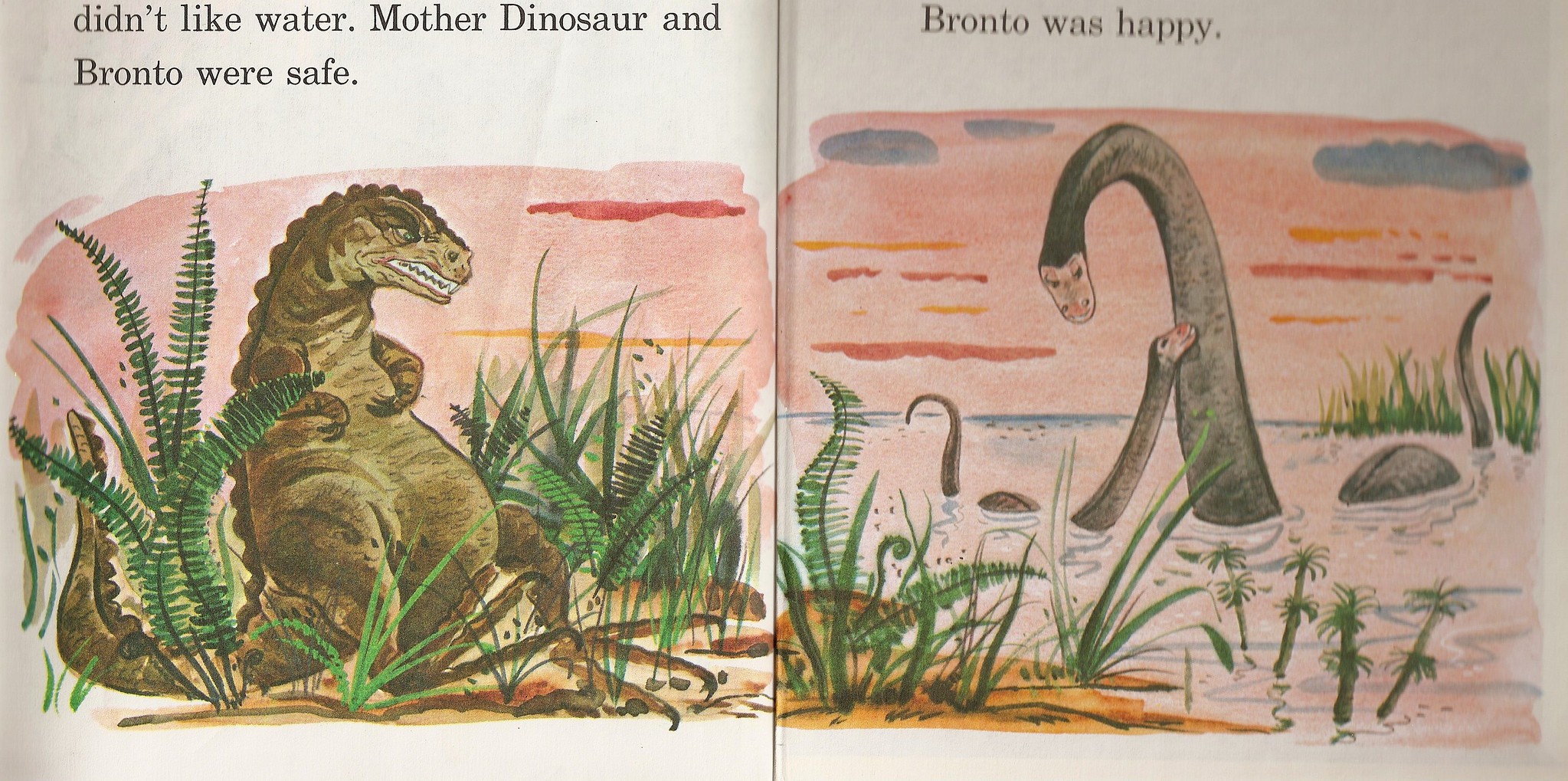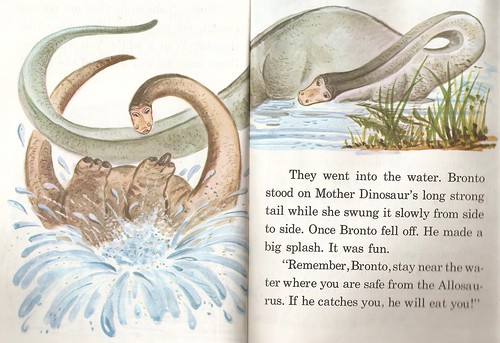Join me for another Golden Oldie, a look at a post from the primeval days of LITC. Originally posted in 2011, it’s Bronto the Dinosaur, a charming children’s book illustrated by George Wilde.

This week in the Vintage Dinosaur Art series, we pay a visit to Bronto the Dinosaur, a storybook published in 1968 by Rand McNally, written by a school teacher and author named Dorothy Thompson Landis. These illustrations are the work of prolific children’s book illustrator George Wilde.

The story, and therefore Wilde’s illustrations, seems to be inspired by the outmoded trope that the sauropods lived their lives partially submerged in water, to support their great weight, though I shudder to think of the raisin-skin they would have had on their legs. The basis of this idea is described in paleontologist William Diller Matthew’s Dinosaurs, published by the American Museum of Natural History in 1915 as part of their “Handbook Series.” In the chapter dedicated to sauropods, called “The Amphibious Dinosaurs,” Matthew writes:
The teeth of the Brontosaurus indicate that it was an herbivorous animal, feeding on soft vegetable food. Three opinions as to the habitat of Amphibious Dinosaurs have been held by scientific authorities. The first, advocated by Professor Owen, who described the first specimens found sixty years ago (1841-60) and supported especially by Professor Cope, has been most generally adopted. This regards the animals as spending their lives entirely in shallow water, partly immersed, wading about on the bottom, or perhaps occasionally swimming, but unable to emerge entirely upon dry land. More recently, Professor Osborn has advocated the view that they resorted occasionally to the land for egg laying or other purposes, and still more recently the view has been taken by Mr. Riggs and the late Professor Hatcher that they were chiefly terrestrial animals. The writer inclines to the view of Owen and Cope, whose unequalled knowledge of comparative anatomy renders their opinion on this doubtful question especially authoritative.
The “Mr. Riggs” Matthew mentions here was Elmer S. Riggs of the Field Museum, and he wasn’t only ahead of the curve considering the habitat of the giant sauropods. He also wrote that Apatosaurus and “Brontosaurus” were the same animal in 1903, more than 80 years before beloved “Brontosaurus” fell out of usage. [Whoops, that didn’t last, sorry Elmer! – D]

Another possible reason for an amphibious lifestyle, provided by Landis in Bronto the Dinosaur, is safety. The evil Allosaurus, afraid of water, sits on dry land, grumbling to himself as Bronto and his mom cuddle waist deep in the swamp.

Check out the feet on that allosaur! You can only wonder where Wilde got the idea to extend those toes to that extreme.
As is my usual habit, I’ve saved my favorite illustration for last. Here, Bronto has supposedly fallen from his mother’s “long, strong tail,” which would indeed have to be pretty darned strong to support his weight. But it sure as heck looks like what’s happening here is that mama is administering a harsh caudal beatdown to the poor youngster.
For a bit more from this title, you can check out the cropped profile-pic ready versions available at the site Vintage Avatars. An affectionate round of applause to Flickr user TNT138 for sharing these scans with the Vintage Dinosaur Art pool. Got old dino books of your own, sitting forlornly on the shelf? Pop ’em in the scanner and share them with us. It feels amazing.









4 Comments
Eric
July 26, 2020 at 1:42 amAnyone else having trouble seeing the images? Because I can’t.
I can however click on the images and get a link to flickr, wherein I can see the images in their entirety.
But as of July 25th 2020, none of the images on this page are showing up.
David Orr
July 29, 2020 at 6:44 pmNot sure what’s been going on with the post, but it may have been a weird Flickr issue.
Marty
August 10, 2020 at 6:20 amI can’t see the pictures either, even though I’ve disabled my adblocker.
David Orr
August 10, 2020 at 8:00 amImages should be displaying now.